2023年江西中考英语复习 七年级上册 Starter Units 1~3,Units 1~4课件(共102张PPT)
文档属性
| 名称 | 2023年江西中考英语复习 七年级上册 Starter Units 1~3,Units 1~4课件(共102张PPT) | 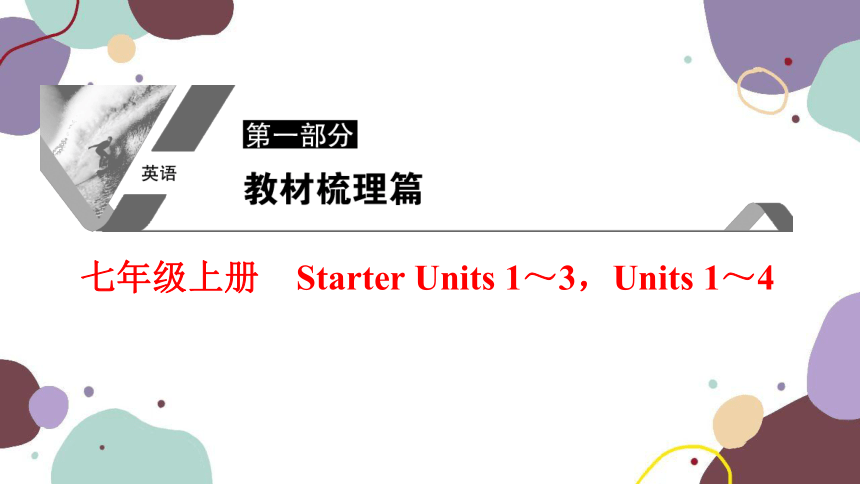 | |
| 格式 | ppt | ||
| 文件大小 | 1.3MB | ||
| 资源类型 | 教案 | ||
| 版本资源 | 人教新目标(Go for it)版 | ||
| 科目 | 英语 | ||
| 更新时间 | 2023-06-10 22:56:56 | ||
图片预览

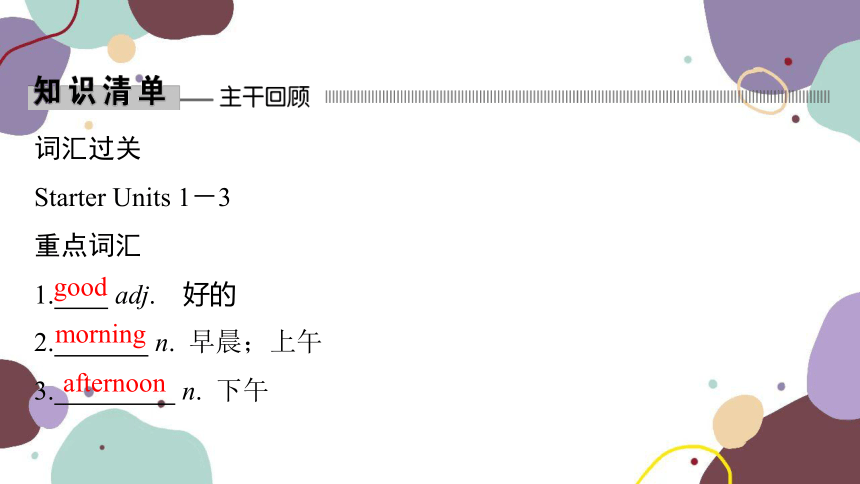
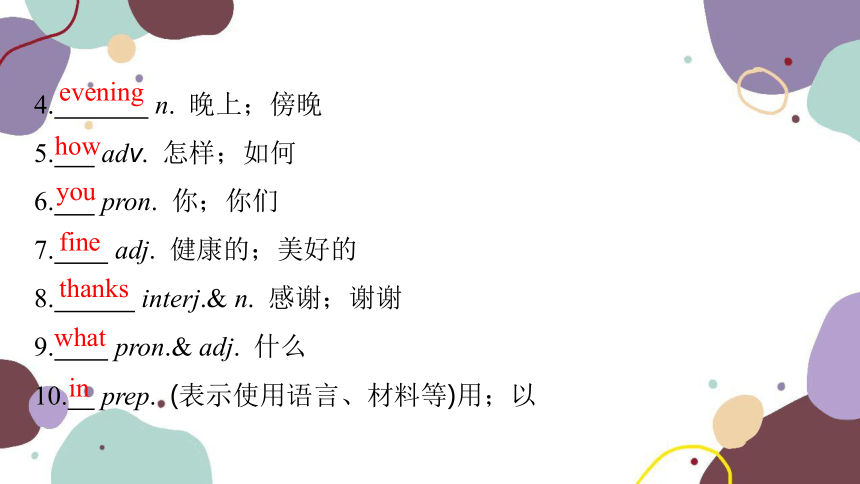
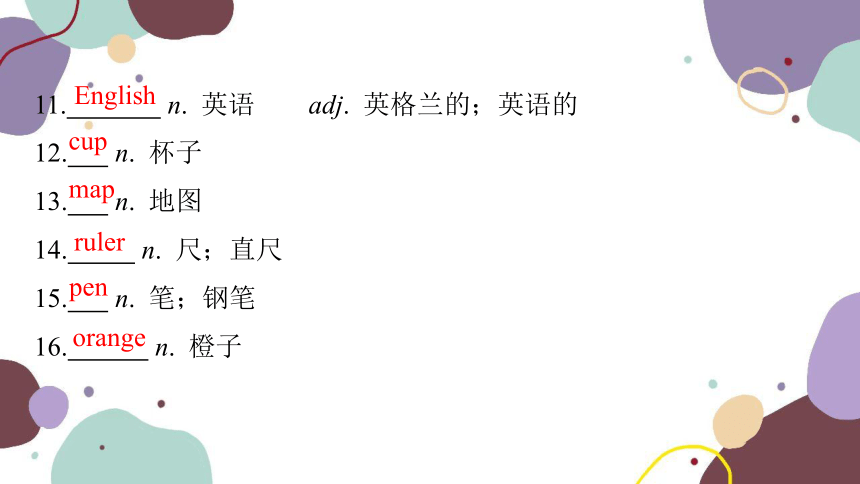
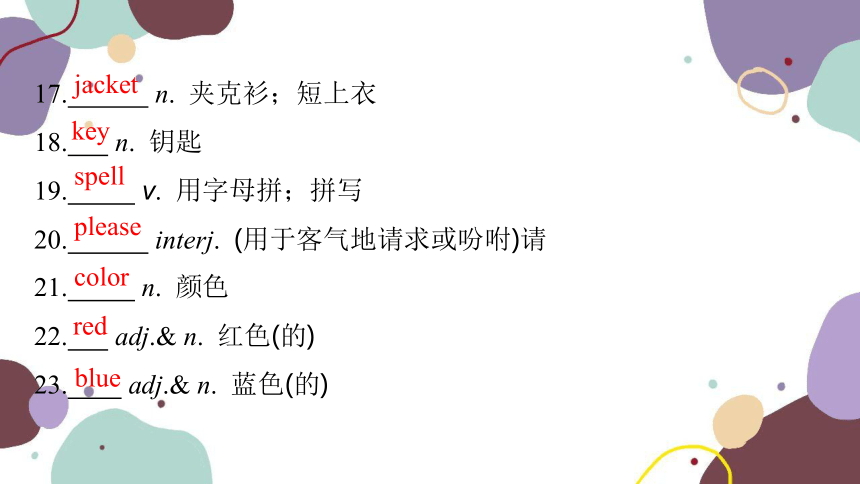
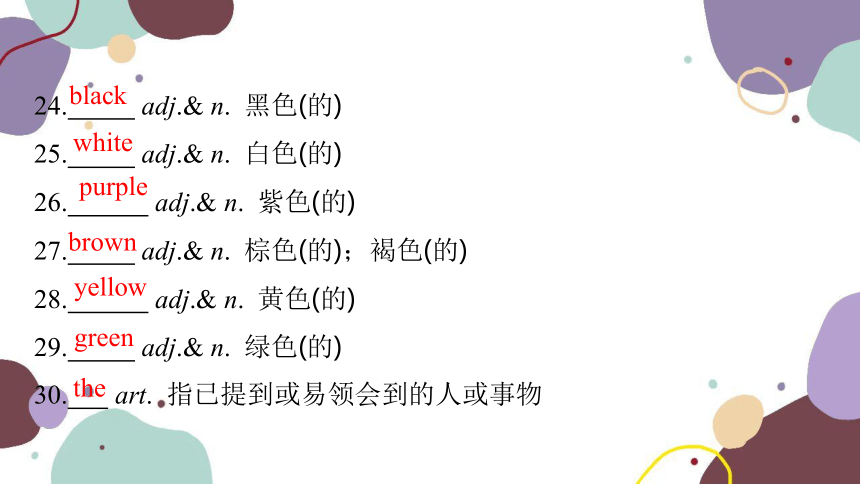
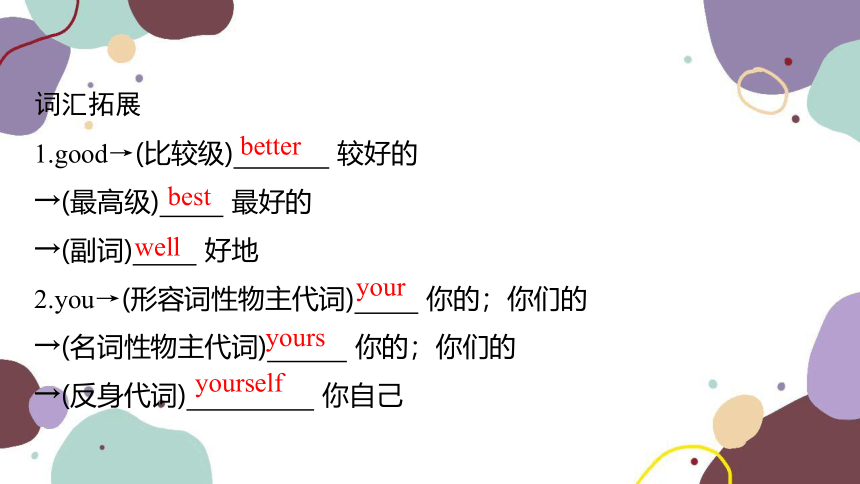
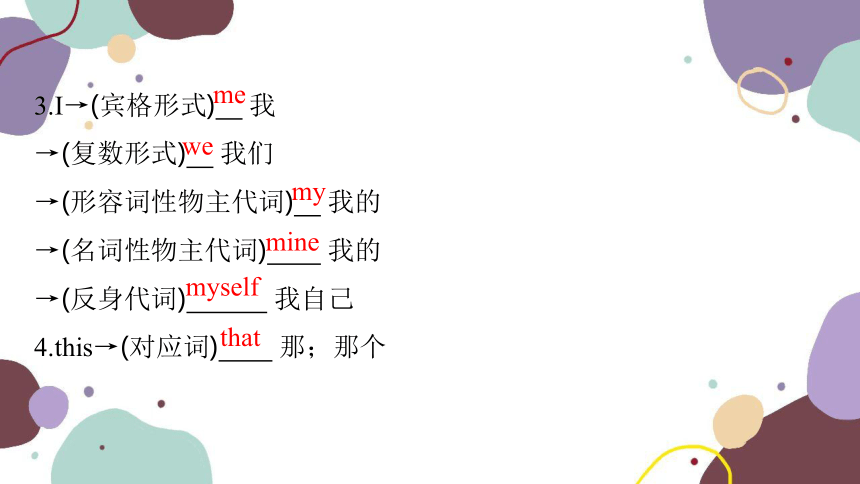
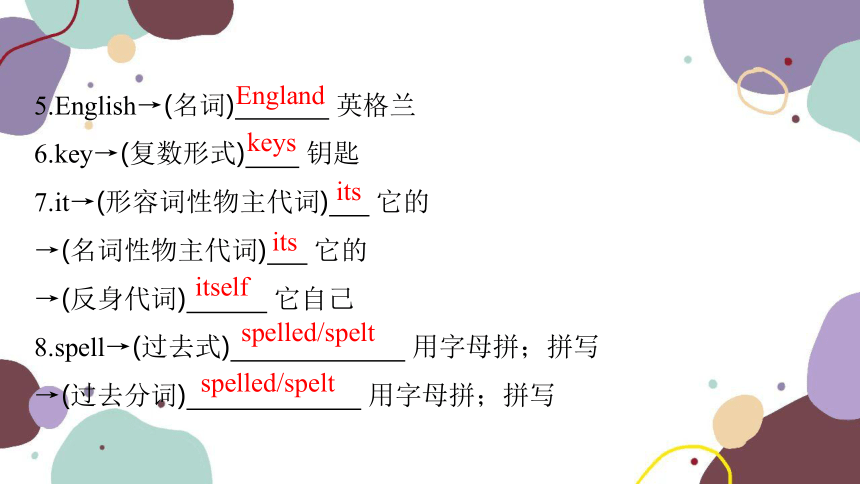
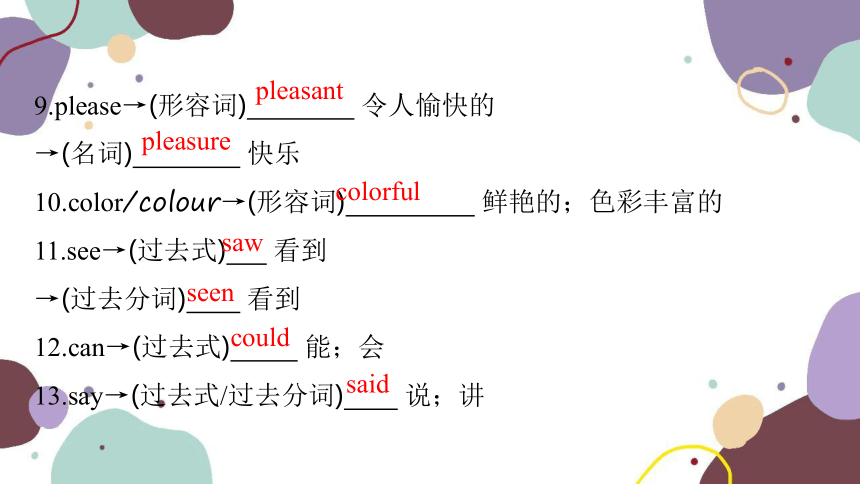

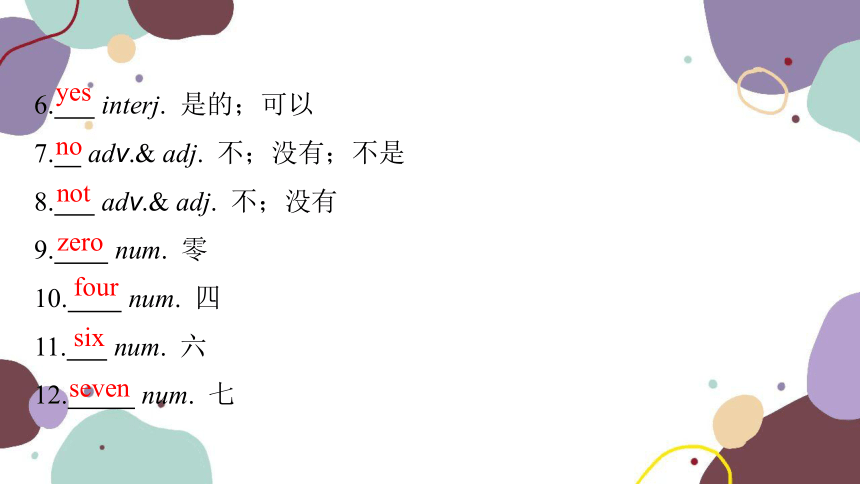
文档简介
(共102张PPT)
七年级上册 Starter Units 1~3,Units 1~4
词汇过关
Starter Units 1-3
重点词汇
1. adj. 好的
2. n. 早晨;上午
3. n. 下午
good
morning
afternoon
4. n. 晚上;傍晚
5. adv. 怎样;如何
6. pron. 你;你们
7. adj. 健康的;美好的
8. interj.& n. 感谢;谢谢
9. pron.& adj. 什么
10. prep. (表示使用语言、材料等)用;以
evening
how
you
fine
thanks
what
in
11. n. 英语 adj. 英格兰的;英语的
12. n. 杯子
13. n. 地图
14. n. 尺;直尺
15. n. 笔;钢笔
16. n. 橙子
English
cup
map
ruler
pen
orange
17. n. 夹克衫;短上衣
18. n. 钥匙
19. v. 用字母拼;拼写
20. interj. (用于客气地请求或吩咐)请
21. n. 颜色
22. adj.& n. 红色(的)
23. adj.& n. 蓝色(的)
jacket
key
spell
please
color
red
blue
24. adj.& n. 黑色(的)
25. adj.& n. 白色(的)
26. adj.& n. 紫色(的)
27. adj.& n. 棕色(的);褐色(的)
28. adj.& n. 黄色(的)
29. adj.& n. 绿色(的)
30. art. 指已提到或易领会到的人或事物
black
white
purple
brown
yellow
green
the
词汇拓展
1.good→(比较级) 较好的
→(最高级) 最好的
→(副词) 好地
2.you→(形容词性物主代词) 你的;你们的
→(名词性物主代词) 你的;你们的
→(反身代词) 你自己
better
best
well
your
yours
yourself
3.I→(宾格形式) 我
→(复数形式) 我们
→(形容词性物主代词) 我的
→(名词性物主代词) 我的
→(反身代词) 我自己
4.this→(对应词) 那;那个
me
we
my
mine
myself
that
5.English→(名词) 英格兰
6.key→(复数形式) 钥匙
7.it→(形容词性物主代词) 它的
→(名词性物主代词) 它的
→(反身代词) 它自己
8.spell→(过去式) 用字母拼;拼写
→(过去分词) 用字母拼;拼写
England
keys
its
its
itself
spelled/spelt
spelled/spelt
9.please→(形容词) 令人愉快的
→(名词) 快乐
10.color/colour→(形容词) 鲜艳的;色彩丰富的
11.see→(过去式) 看到
→(过去分词) 看到
12.can→(过去式) 能;会
13.say→(过去式/过去分词) 说;讲
pleasant
pleasure
colorful
saw
seen
could
said
Unit 1
重点词汇
1. n. 名字;名称
2. adj. 令人愉快的;宜人的
3. 常用于动词原形之前,表示动词不定式
4. adv. 也;又;太
5. conj. 和;又;而
name
nice
to
too
and
6. interj. 是的;可以
7. adv.& adj. 不;没有;不是
8. adv.& adj. 不;没有
9. num. 零
10. num. 四
11. num. 六
12. num. 七
yes
no
not
zero
four
six
seven
13. n. 电话;电话机
14. n. 号码;数字
15. adj. 最后的;末尾的
16. adj. 中间的
n. 中间
17. n. 学校
18. v. 遇见;相逢
19. n. 中国
telephone/phone
number
last
middle
school
meet
China
词汇拓展
1.too→(近义词) 也
2.yes→(反义词) 不;没有;不是
3.one→(序数词) 第一
→(副词) 一次
4.two→(序数词) 第二
→(副词) 两次
also
no
first
once
second
twice
5.three→(序数词) 第三
6.five→(序数词) 第五
7.eight→(序数词) 第八
8.nine→(序数词) 第九
9.friend→(形容词) 友好的
→(名词) 友谊;友情
third
fifth
eighth
ninth
friendly
friendship
10.she→(人称代词宾格) 她
→(形容词性物主代词) 她的
→(名词性物主代词) 她的
→(反身代词) 她自己
11.he→(人称代词宾格) 他
→(形容词/名词性物主代词) 他的
→(反身代词) 他自己
her
her
hers
herself
him
his
himself
12.meet→(名词) 会议;会见
→(过去式/过去分词) 遇见;相逢
13.China→(名词) 中国人;汉语
→(形容词) 中国的;中国人的;汉语的
meeting
met
Chinese
Chinese
Unit 2
重点词汇
1. n. 姐;妹
2. n. 母亲;妈妈
3. n. 父亲;爸爸
4. n. 父(母)亲
5. n. 兄;弟
sister
mother
father
parent
brother
6. n. (外)祖母;奶奶;外婆;姥姥
7. n. (外)祖父;爷爷;外公;姥爷
8. n. 祖父(母);外祖父(母)
9. n. 姑母;姨母;伯母;婶母;舅母
10. n. 舅父;叔父;伯父;姑父;姨父
11. n. 堂兄(弟、姊、妹);表兄(弟、姊、妹)
12. n. 女儿
grandmother
grandfather
grandparent
aunt
uncle
cousin
daughter
13. n. 儿子
14. pron. 那些
15. pron. 这些
16. interj. 嗯;好吧
17. n. 一天;一日;白天
18. interj. (= )再见
19. adv. (用以介绍某人或某物)这就是;在这里
son
those
these
well
day
bye
goodbye
here
20. n. 照片
21. prep. 属于(某人或某物);关于(某人或某物)
22. adj.& n. 下一个(的);接下来(的)
23. n. 照片;图画
24. n. 女孩
25. n. 狗
photo
of
next
picture
girl
dog
词汇拓展
1.family→(复数形式) 家;家庭
2.have→(第三人称单数形式) 有;经历;经受
→(过去式/过去分词) 有;经历;经受
3.these→(对应词) 那些
4.photo→(同义词) 照片;图画
→(复数形式) 照片
families
has
had
those
picture
photos
5.girl→(对应词) 男孩
6.dog→(复数形式) 狗
7.they→(人称代词宾格) 他(她、它)们
→(形容词性物主代词) 他(她、它)们的
→(名词性物主代词) 他(她、它)们的
boy
dogs
them
their
theirs
Unit 3
重点词汇
1. n. 书
2. n. 词典;字典
3. v. 感谢;谢谢
4. v. 原谅;宽恕
book
dictionary
thank
excuse
5. n. 老师;教师
6. adj. 受欢迎的
7. n. 棒球
8. n. 表;手表
9. n. 计算机;电脑
10. n. 游戏;运动;比赛
teacher
welcome
baseball
watch
computer
game
11. n. 卡片
12. n. 袋;包
13. v. 请求;要求;询问
14. adj. 一些;某些
pron. 有些;有的
15. v. (给……)打电话
card
bag
ask
some
call
词汇拓展
1.help→(形容词) 有帮助的
2.box→(复数形式) 箱;盒
3.dictionary→(复数形式) 词典;字典
4.find→(过去式/过去分词) 找到;发现
→(反义词) 丢失
helpful
boxes
dictionaries
found
lose
5.lost→(原形) 遗失;丢失
6.teacher→(动词) 教;教授;教导
→(过去式/过去分词) 教
7.watch→(复数形式) 表;手表
8.library→(复数形式) 图书馆
9.some→(近义词) 任何的;所有的
lose
teach
taught
watches
libraries
any
Unit 4
重点词汇
1. adv. 在哪里;到哪里
2. n. 桌子
3. n. 床
4. n. 沙发
where
table
bed
sofa
5. n. 椅子
6. n. 书桌
7. n. 房间
8. prep. 在……上
9. prep. 在……下
10. n. 帽子
chair
desk
room
on
under
hat
11. n. 头
12. v. 知道;了解
13. n. 磁带;录音带;录像带
14. n. 收音机;无线电广播
15. n. 时钟
16. n. 模型
head
know
tape
radio
clock
model
17. n. 飞机
18. adj. 整洁的;井井有条的
19. conj. 但是
20. adv. 处处;到处;各个地方
21. adv. 总是
plane
tidy
but
everywhere
always
词汇拓展
1.under→(反义词) 在……上
2.come→(过去式) 来;来到
→(过去分词) 来;来到
3.think→(过去式/过去分词) 认为;想;思考
→(名词) 想法;看法;主意;记忆;心思;思想
on
came
come
thought
thought
4.know→(过去式) 知道;了解
→(过去分词) 知道;了解
→(名词) 知识;学问
5.player→(动词) 游戏;扮演;演奏;播放;同……比赛
6.radio→(复数形式) 收音机;无线电广播
knew
known
knowledge
play
radios
重点短语
Starter
Units 1-3
1.早上好 ______________
2.晚上好 _____________
3.用英语 ___________
good morning
good evening
in English
Unit 1
1.中学;初中 ________________
2.在中国 __________
Unit 2
(表示祝愿)过得愉快 ________________
middle school
in China
have a good day
Unit 3
1.劳驾;请原谅 __________
2.请求;恳求(给予) ___________
3.一套;一副;一组 _________
4.为……而感激你(们) _______________
excuse me
ask...for...
a set of
thank you for...
Unit 4
1.快点儿 __________
2.在椅子下 ________________
3.在书包里 _________________
4.在沙发上 ____________
come on
under the chair
in the schoolbag
on the sofa
重点句型
Starter Units 1-3
1.________ this _____ English?
这个用英语怎么说?
2.________ this?这是什么?
What's
in
What's
Unit 1
1.—_______ _____ your name?
你叫什么名字?
—My name's Jenny.我叫珍妮。
2.—________ ________ telephone number?
你的电话号码是多少?
—________ 358 6344.是358 6344。
What is
What's your
It's
Unit 2
—________ ______ they?他们是谁?
—__________ my grandparents.他们是我的祖父母。
Who are
They're
Unit 3
1.— your pencil?
这是你的铅笔吗?
—Yes,it is./No,it isn't.
是的,它是。/不,它不是。
Is this
2.— . your books?
打扰一下,这些是你的书吗?
—No,they .
不,它们不是。
Excuse me Are these
aren't
3.— your help,Anna.
安娜,谢谢你帮忙。
— .
不用谢。
4. you spell it?
你怎样拼写它?
Thank you for
You're welcome
How do
5. 685 6034.
(请)打电话685 6034找我。
Unit 4
— their keys?他们的钥匙在哪儿?
—They're the table.它们在桌子上。
Call me at
Where are
on
语法
1.冠词
2.一般现在时
3.一般疑问句
4.人称代词、物主代词、指示代词
5.基数词(0-9)
6.连词and
7.方位介词on、in、under
8.由what、who、where引导的特殊疑问句
话题
Starter Unit 1 Meeting friends (见朋友)
Starter Unit 2 Things around you (你周围的事物)
Starter Unit 3 Colors (颜色)
Unit 1 Making new friends (结交新朋友)
Unit 2 The family (家人)
Unit 3 Things in the classroom (教室里的物品)
Unit 4 Things around the house (房子周围的事物)
What about...?句型
[考点演练]
1.—What about taking a walk after dinner
— .I have to help my mother with housework.
A.I'm afraid not B.Of course
C.I'm fine D.My pleasure
A
2.The hotel is not far from the museum.What about (go) there by bus
going
3.No matter how hard the difficulty is,you'd better it bravely.
4.—Lisa,I often feel so bored during the weekends.
—Well,why not in some volunteer activities?They are very meaningful.
face
join
5.—Would you mind on the TV?The Spring Festival Gala has just begun.
—Of course not. Just go ahead.
6.—Shall we a movie after working for a long time
—Sounds good. It's very relaxing.
turning
watch
[考点精讲]
“What about...?”相当于“How about...?”意为“……怎么样?”。具体用法如下:
常用的肯定答语为“OK!/Sounds good./Good idea.”等。否定答语为“Sorry,I.../I'm afraid not.”等。
[拓展延伸]
常见的提建议句型归纳如下:
Thank you for...句型
[考点演练]
7.Thanks reminding me of the meeting in time,or I will be late for it.
A.to B.for
C.with D.in
B
8.—Thank you for giving me a hand when I was in trouble.
— .
A.Not at all B.Just so so
C.Hurry up D.Sorry,I won't
A
9.谢谢你给我学好英语的建议。
some suggestions on learning English well.
Thanks for giving me/Thank you for giving me
10.Thanks those astronauts' hard work,we are able to explore more secrets about space.
A.to B.for
C.with D.in
A
11. your help,now I have a better understanding of the problem.
A.As for B.Thanks to
C.Thanks for D.As to
B
[考点精讲]
thank you for相当于thanks for,意为“因……而感谢你”。for 为介词,强调感谢的原因。后接名词、代词或动词 ing形式作宾语。回答该句式的答语有:Not at all./You are welcome./That's all right./My pleasure./It's a (my) pleasure.等。
Thank you again for changing my life.
再次感谢你改变了我的生活。[八(下)Unit 2]
[拓展延伸]
thanks to的用法:
thanks to意为“多亏,幸亏,由于”,与because of意思相近,表示由于某人或某物的存在才有了某种好的结果。to是介词,其后接感谢的对象(名词、代词或动词 ing形式)。
Thanks to Mr.Wang and the passengers,the doctors saved the man in time.多亏了王先生和乘客们,医生及时挽救了那个人的生命。[八(下)Unit 1]
help的用法
[考点演练]
12.The movie Chinese Doctors is so moving that I couldn't help _______ in the movie theatre.
13.The school's purposes are to teach students to be useful people to society and help them their goals.
crying
(to) achieve
14.Betty is very warm hearted and she often helps the neighbor ______ housework.
15.Before you ask someone help,find out if he or she is the right person first.
with
for
16.Dear friends,come here and help to the delicious dishes!
17.在老师和同学们的帮助下,这学期他的英语取得了很大的进步。
the teacher and classmates,he has made great progress in English this term.
yourselves
With the help of
[考点精讲]
Mother is always at home,ready to play with the children and help them do their homework.
母亲总是在家,随时准备和孩子们一起玩,并帮助他们做家庭作业。
ask的用法
[考点演练]
18.In some countries,it is impolite to ask ladies their ages or other personal information.
about
19.You can ask your teachers advice if you want to know more learning skills.
20.We are asked not lies to others,for it may make people lose trust in us gradually.
21.You should ask Bob his own clothes.He is eleven years old.
for
to tell
to wash
[考点精讲]
Could you ask her to call me at 8765 4321
你能让她拨打号码8765 4321找我吗?[七(下)Unit 7]
If you meet some problems,you can ask your teachers for help.
如果你遇到一些难题,你可以向你的老师们求助。
1.fine
熟义:adj.健康的;美好的
生义:A.v.处……以罚金 B.n.罚款 C.adj.晴朗的
①Look at the blue sky.What fine weather it is![2019葫芦岛单选] ___
②Fines also go to those who get bad reviews from customers. ___
③The policeman fined the driver who broke the law with 100 yuan. ___
C
B
A
2.name
熟义:n.名字;名称 v.命名;给……取名
生义:A.v.任命;委任 B.n.名誉;名声;名气
①He is always in a hurry and in the end loses both time and his good name. ___
②Our teacher decides to name Lucy as our group leader. ___
B
A
3.book
熟义:n.书
生义:A.v.预约;预订 B.v.登记
Book your hotel room well so that you don't have any problems when you get wherever you're going.[译林牛津八(下)Unit 3] ___
A
4.welcome
熟义:adj.受欢迎的
生义:A.v.欢迎 B.v.欣然接受
The Barton Photography (摄影) Club welcomes new members.[2020江西阅读] ___
A
5.watch
熟义:n.表;手表 v.看;观看(watch TV看电视)
生义:A.v.照看;看护 B.v.留意;当心
①My neighbor helped me watch the pet for a couple of days when I was on business. ___
②Then,say what is really bothering you,but watch how you express yourself. ___
A
B
Ⅰ.单项填空
1.This skirt is very beautiful, it's cheap.
A.so B.or
C.and D.but
C
2.—Is this dictionary yours
—Yes.My parents bought for my language learning.
A.one B.it
C.other D.another
B
3.We all need .When we are in trouble,they are always there to help us.
A.books B.time
C.friends D.money
C
4.Mary,I can't find pen.Can I borrow for a while
A.my;your B.my;yours
C.mine;your D.mine;yours
B
5.Jack me not to walk on the grass.
A.knew B.saw
C.asked D.helped
C
Ⅱ.完形填空
Do you have a big family?Actually in many Asian countries, 1 families are common. Families usually have three generations (一代人) living together. When parents are 2 with work,grandparents help to do housework and 3 the children.
话题:家庭 难易度:★★★ 体裁:说明文
However,in most western countries,many people like nuclear families(核心家庭)with only parents and 4 .During the 5 ,working parents send their children to grandparents' home or a day care center. And 6 work,they take the children back home.Some families are even described as DINK—double income(双薪),no kids.According to a Pew Research report,one in five American couples don't want a 7 .
Besides structure,the responsibility of parents to their children is also different.For example,in China,many parents take care of their children until they 8 up.It's 9 for parents to pay their children's college tuition(学费).After graduation,many parents also help to find a job for their children,or help them buy a 10 .
In western countries,however,children 11 to be independent after they 12 the age of 18.Most parents will not pay their children's tuition. Young people find part time jobs or turn to the government for help with 13 tuition.After graduation,if they can find a job,parents usually won't 14 for their daily expenses(费用).
Although families may be different in the East and West,every 15 is a warm place to teach us important values of love and care.
1.A.small B.big
C.medium D.long
答案:B
2.A.busy B.free
C.pleased D.sad
答案:A
3.A.look for B.look at
C.look after D.look like
答案:C
4.A.grandparents B.brothers
C.sisters D.children
答案:D
5.A.night B.daytime
C.afternoon D.noon
答案:B
6.A.before B.below
C.after D.without
答案:C
7.A.house B.job
C.child D.dream
答案:C
8.A.grow B.look
C.take D.break
答案:A
9.A.surprising B.difficult
C.natural D.relaxed
答案:C
10.A.house B.book
C.job D.friend
答案:A
11.A.hate B.try
C.provide D.achieve
答案:B
12.A.reach B.arrive
C.get D.sell
答案:A
13.A.their B.my
C.his D.her
答案:A
14.A.spend B.take
C.pay D.cost
答案:C
15.A.father B.school
C.family D.mother
答案:C
Ⅲ.阅读理解
Kathy could still remember the night she had to leave her home in Hungary. It was the beginning of World War Ⅱ and her family had to leave their country as soon as possible.She quickly filled a bag with a few pieces of clothing,her diary,and her treasure—a beautiful silk scarf.
话题:人物 难易度:★★★ 体裁:记叙文
Kathy and her best friend,Monica,had asked their parents to buy them matching scarves.They each would wear the scarves as a symbol of their friendship.Kathy had no idea that she was going to America that night and would not be returning.
Kathy kept that special silk scarf for many years.One day she decided to give it to her granddaughter,Eliza,to wear to her first job interview for good luck.Kathy was afraid that Eliza would lose the scarf,but the granddaughter promised,“Don't worry,Grandma. Nothing's going to happen to your scarf.You'll see.It is going to bring both of us luck today.”And with that,Eliza kissed her grandmother and left for the interview.
That afternoon Eliza left the interview,feeling sure that she had got the job.So she decided to celebrate by going to a restaurant.As she was sitting at her table,she felt someone looking at her.Sitting next to her was an old woman,who could not take her eyes away from her.
“Excuse me,do I know you?” Eliza asked.
“I'm sorry,dear,but you make me think of someone I once knew,”the old woman replied.“My best friend looked like you and used to wear a scarf just like the one you're wearing around your neck.” Eliza listened carefully,with her eyes and mouth wide open.She had heard stories of her grandmother's best friend and knew the meaning of the scarf. Could this be Monica,her grandmother's friend in childhood
Eliza introduced herself and waited to hear the name of the old woman.
“My name's Monica,dear.I lived in Hungary as a child,but my family had to leave when I was fourteen years old.I've been living here in California ever since,”said the old woman.
Eliza could not believe her ears...
1.What did Kathy NOT bring with her when she left her country
A.Her diary.
B.A silk scarf.
C.A book.
D.Some pieces of clothing.
答案:C
2.What does the underlined word “it” refer to
A.Eliza's first job. B.The scarf.
C.The skirt. D.The hat.
答案:B
3.Why couldn't the old woman in the restaurant take her eyes away from Eliza
A.Because she thought Eliza was a very beautiful girl.
B.Because she thought of her best friend,Kathy.
C.Because she has met Eliza before.
D.Because Eliza was looking at her.
答案:B
七年级上册 Starter Units 1~3,Units 1~4
词汇过关
Starter Units 1-3
重点词汇
1. adj. 好的
2. n. 早晨;上午
3. n. 下午
good
morning
afternoon
4. n. 晚上;傍晚
5. adv. 怎样;如何
6. pron. 你;你们
7. adj. 健康的;美好的
8. interj.& n. 感谢;谢谢
9. pron.& adj. 什么
10. prep. (表示使用语言、材料等)用;以
evening
how
you
fine
thanks
what
in
11. n. 英语 adj. 英格兰的;英语的
12. n. 杯子
13. n. 地图
14. n. 尺;直尺
15. n. 笔;钢笔
16. n. 橙子
English
cup
map
ruler
pen
orange
17. n. 夹克衫;短上衣
18. n. 钥匙
19. v. 用字母拼;拼写
20. interj. (用于客气地请求或吩咐)请
21. n. 颜色
22. adj.& n. 红色(的)
23. adj.& n. 蓝色(的)
jacket
key
spell
please
color
red
blue
24. adj.& n. 黑色(的)
25. adj.& n. 白色(的)
26. adj.& n. 紫色(的)
27. adj.& n. 棕色(的);褐色(的)
28. adj.& n. 黄色(的)
29. adj.& n. 绿色(的)
30. art. 指已提到或易领会到的人或事物
black
white
purple
brown
yellow
green
the
词汇拓展
1.good→(比较级) 较好的
→(最高级) 最好的
→(副词) 好地
2.you→(形容词性物主代词) 你的;你们的
→(名词性物主代词) 你的;你们的
→(反身代词) 你自己
better
best
well
your
yours
yourself
3.I→(宾格形式) 我
→(复数形式) 我们
→(形容词性物主代词) 我的
→(名词性物主代词) 我的
→(反身代词) 我自己
4.this→(对应词) 那;那个
me
we
my
mine
myself
that
5.English→(名词) 英格兰
6.key→(复数形式) 钥匙
7.it→(形容词性物主代词) 它的
→(名词性物主代词) 它的
→(反身代词) 它自己
8.spell→(过去式) 用字母拼;拼写
→(过去分词) 用字母拼;拼写
England
keys
its
its
itself
spelled/spelt
spelled/spelt
9.please→(形容词) 令人愉快的
→(名词) 快乐
10.color/colour→(形容词) 鲜艳的;色彩丰富的
11.see→(过去式) 看到
→(过去分词) 看到
12.can→(过去式) 能;会
13.say→(过去式/过去分词) 说;讲
pleasant
pleasure
colorful
saw
seen
could
said
Unit 1
重点词汇
1. n. 名字;名称
2. adj. 令人愉快的;宜人的
3. 常用于动词原形之前,表示动词不定式
4. adv. 也;又;太
5. conj. 和;又;而
name
nice
to
too
and
6. interj. 是的;可以
7. adv.& adj. 不;没有;不是
8. adv.& adj. 不;没有
9. num. 零
10. num. 四
11. num. 六
12. num. 七
yes
no
not
zero
four
six
seven
13. n. 电话;电话机
14. n. 号码;数字
15. adj. 最后的;末尾的
16. adj. 中间的
n. 中间
17. n. 学校
18. v. 遇见;相逢
19. n. 中国
telephone/phone
number
last
middle
school
meet
China
词汇拓展
1.too→(近义词) 也
2.yes→(反义词) 不;没有;不是
3.one→(序数词) 第一
→(副词) 一次
4.two→(序数词) 第二
→(副词) 两次
also
no
first
once
second
twice
5.three→(序数词) 第三
6.five→(序数词) 第五
7.eight→(序数词) 第八
8.nine→(序数词) 第九
9.friend→(形容词) 友好的
→(名词) 友谊;友情
third
fifth
eighth
ninth
friendly
friendship
10.she→(人称代词宾格) 她
→(形容词性物主代词) 她的
→(名词性物主代词) 她的
→(反身代词) 她自己
11.he→(人称代词宾格) 他
→(形容词/名词性物主代词) 他的
→(反身代词) 他自己
her
her
hers
herself
him
his
himself
12.meet→(名词) 会议;会见
→(过去式/过去分词) 遇见;相逢
13.China→(名词) 中国人;汉语
→(形容词) 中国的;中国人的;汉语的
meeting
met
Chinese
Chinese
Unit 2
重点词汇
1. n. 姐;妹
2. n. 母亲;妈妈
3. n. 父亲;爸爸
4. n. 父(母)亲
5. n. 兄;弟
sister
mother
father
parent
brother
6. n. (外)祖母;奶奶;外婆;姥姥
7. n. (外)祖父;爷爷;外公;姥爷
8. n. 祖父(母);外祖父(母)
9. n. 姑母;姨母;伯母;婶母;舅母
10. n. 舅父;叔父;伯父;姑父;姨父
11. n. 堂兄(弟、姊、妹);表兄(弟、姊、妹)
12. n. 女儿
grandmother
grandfather
grandparent
aunt
uncle
cousin
daughter
13. n. 儿子
14. pron. 那些
15. pron. 这些
16. interj. 嗯;好吧
17. n. 一天;一日;白天
18. interj. (= )再见
19. adv. (用以介绍某人或某物)这就是;在这里
son
those
these
well
day
bye
goodbye
here
20. n. 照片
21. prep. 属于(某人或某物);关于(某人或某物)
22. adj.& n. 下一个(的);接下来(的)
23. n. 照片;图画
24. n. 女孩
25. n. 狗
photo
of
next
picture
girl
dog
词汇拓展
1.family→(复数形式) 家;家庭
2.have→(第三人称单数形式) 有;经历;经受
→(过去式/过去分词) 有;经历;经受
3.these→(对应词) 那些
4.photo→(同义词) 照片;图画
→(复数形式) 照片
families
has
had
those
picture
photos
5.girl→(对应词) 男孩
6.dog→(复数形式) 狗
7.they→(人称代词宾格) 他(她、它)们
→(形容词性物主代词) 他(她、它)们的
→(名词性物主代词) 他(她、它)们的
boy
dogs
them
their
theirs
Unit 3
重点词汇
1. n. 书
2. n. 词典;字典
3. v. 感谢;谢谢
4. v. 原谅;宽恕
book
dictionary
thank
excuse
5. n. 老师;教师
6. adj. 受欢迎的
7. n. 棒球
8. n. 表;手表
9. n. 计算机;电脑
10. n. 游戏;运动;比赛
teacher
welcome
baseball
watch
computer
game
11. n. 卡片
12. n. 袋;包
13. v. 请求;要求;询问
14. adj. 一些;某些
pron. 有些;有的
15. v. (给……)打电话
card
bag
ask
some
call
词汇拓展
1.help→(形容词) 有帮助的
2.box→(复数形式) 箱;盒
3.dictionary→(复数形式) 词典;字典
4.find→(过去式/过去分词) 找到;发现
→(反义词) 丢失
helpful
boxes
dictionaries
found
lose
5.lost→(原形) 遗失;丢失
6.teacher→(动词) 教;教授;教导
→(过去式/过去分词) 教
7.watch→(复数形式) 表;手表
8.library→(复数形式) 图书馆
9.some→(近义词) 任何的;所有的
lose
teach
taught
watches
libraries
any
Unit 4
重点词汇
1. adv. 在哪里;到哪里
2. n. 桌子
3. n. 床
4. n. 沙发
where
table
bed
sofa
5. n. 椅子
6. n. 书桌
7. n. 房间
8. prep. 在……上
9. prep. 在……下
10. n. 帽子
chair
desk
room
on
under
hat
11. n. 头
12. v. 知道;了解
13. n. 磁带;录音带;录像带
14. n. 收音机;无线电广播
15. n. 时钟
16. n. 模型
head
know
tape
radio
clock
model
17. n. 飞机
18. adj. 整洁的;井井有条的
19. conj. 但是
20. adv. 处处;到处;各个地方
21. adv. 总是
plane
tidy
but
everywhere
always
词汇拓展
1.under→(反义词) 在……上
2.come→(过去式) 来;来到
→(过去分词) 来;来到
3.think→(过去式/过去分词) 认为;想;思考
→(名词) 想法;看法;主意;记忆;心思;思想
on
came
come
thought
thought
4.know→(过去式) 知道;了解
→(过去分词) 知道;了解
→(名词) 知识;学问
5.player→(动词) 游戏;扮演;演奏;播放;同……比赛
6.radio→(复数形式) 收音机;无线电广播
knew
known
knowledge
play
radios
重点短语
Starter
Units 1-3
1.早上好 ______________
2.晚上好 _____________
3.用英语 ___________
good morning
good evening
in English
Unit 1
1.中学;初中 ________________
2.在中国 __________
Unit 2
(表示祝愿)过得愉快 ________________
middle school
in China
have a good day
Unit 3
1.劳驾;请原谅 __________
2.请求;恳求(给予) ___________
3.一套;一副;一组 _________
4.为……而感激你(们) _______________
excuse me
ask...for...
a set of
thank you for...
Unit 4
1.快点儿 __________
2.在椅子下 ________________
3.在书包里 _________________
4.在沙发上 ____________
come on
under the chair
in the schoolbag
on the sofa
重点句型
Starter Units 1-3
1.________ this _____ English?
这个用英语怎么说?
2.________ this?这是什么?
What's
in
What's
Unit 1
1.—_______ _____ your name?
你叫什么名字?
—My name's Jenny.我叫珍妮。
2.—________ ________ telephone number?
你的电话号码是多少?
—________ 358 6344.是358 6344。
What is
What's your
It's
Unit 2
—________ ______ they?他们是谁?
—__________ my grandparents.他们是我的祖父母。
Who are
They're
Unit 3
1.— your pencil?
这是你的铅笔吗?
—Yes,it is./No,it isn't.
是的,它是。/不,它不是。
Is this
2.— . your books?
打扰一下,这些是你的书吗?
—No,they .
不,它们不是。
Excuse me Are these
aren't
3.— your help,Anna.
安娜,谢谢你帮忙。
— .
不用谢。
4. you spell it?
你怎样拼写它?
Thank you for
You're welcome
How do
5. 685 6034.
(请)打电话685 6034找我。
Unit 4
— their keys?他们的钥匙在哪儿?
—They're the table.它们在桌子上。
Call me at
Where are
on
语法
1.冠词
2.一般现在时
3.一般疑问句
4.人称代词、物主代词、指示代词
5.基数词(0-9)
6.连词and
7.方位介词on、in、under
8.由what、who、where引导的特殊疑问句
话题
Starter Unit 1 Meeting friends (见朋友)
Starter Unit 2 Things around you (你周围的事物)
Starter Unit 3 Colors (颜色)
Unit 1 Making new friends (结交新朋友)
Unit 2 The family (家人)
Unit 3 Things in the classroom (教室里的物品)
Unit 4 Things around the house (房子周围的事物)
What about...?句型
[考点演练]
1.—What about taking a walk after dinner
— .I have to help my mother with housework.
A.I'm afraid not B.Of course
C.I'm fine D.My pleasure
A
2.The hotel is not far from the museum.What about (go) there by bus
going
3.No matter how hard the difficulty is,you'd better it bravely.
4.—Lisa,I often feel so bored during the weekends.
—Well,why not in some volunteer activities?They are very meaningful.
face
join
5.—Would you mind on the TV?The Spring Festival Gala has just begun.
—Of course not. Just go ahead.
6.—Shall we a movie after working for a long time
—Sounds good. It's very relaxing.
turning
watch
[考点精讲]
“What about...?”相当于“How about...?”意为“……怎么样?”。具体用法如下:
常用的肯定答语为“OK!/Sounds good./Good idea.”等。否定答语为“Sorry,I.../I'm afraid not.”等。
[拓展延伸]
常见的提建议句型归纳如下:
Thank you for...句型
[考点演练]
7.Thanks reminding me of the meeting in time,or I will be late for it.
A.to B.for
C.with D.in
B
8.—Thank you for giving me a hand when I was in trouble.
— .
A.Not at all B.Just so so
C.Hurry up D.Sorry,I won't
A
9.谢谢你给我学好英语的建议。
some suggestions on learning English well.
Thanks for giving me/Thank you for giving me
10.Thanks those astronauts' hard work,we are able to explore more secrets about space.
A.to B.for
C.with D.in
A
11. your help,now I have a better understanding of the problem.
A.As for B.Thanks to
C.Thanks for D.As to
B
[考点精讲]
thank you for相当于thanks for,意为“因……而感谢你”。for 为介词,强调感谢的原因。后接名词、代词或动词 ing形式作宾语。回答该句式的答语有:Not at all./You are welcome./That's all right./My pleasure./It's a (my) pleasure.等。
Thank you again for changing my life.
再次感谢你改变了我的生活。[八(下)Unit 2]
[拓展延伸]
thanks to的用法:
thanks to意为“多亏,幸亏,由于”,与because of意思相近,表示由于某人或某物的存在才有了某种好的结果。to是介词,其后接感谢的对象(名词、代词或动词 ing形式)。
Thanks to Mr.Wang and the passengers,the doctors saved the man in time.多亏了王先生和乘客们,医生及时挽救了那个人的生命。[八(下)Unit 1]
help的用法
[考点演练]
12.The movie Chinese Doctors is so moving that I couldn't help _______ in the movie theatre.
13.The school's purposes are to teach students to be useful people to society and help them their goals.
crying
(to) achieve
14.Betty is very warm hearted and she often helps the neighbor ______ housework.
15.Before you ask someone help,find out if he or she is the right person first.
with
for
16.Dear friends,come here and help to the delicious dishes!
17.在老师和同学们的帮助下,这学期他的英语取得了很大的进步。
the teacher and classmates,he has made great progress in English this term.
yourselves
With the help of
[考点精讲]
Mother is always at home,ready to play with the children and help them do their homework.
母亲总是在家,随时准备和孩子们一起玩,并帮助他们做家庭作业。
ask的用法
[考点演练]
18.In some countries,it is impolite to ask ladies their ages or other personal information.
about
19.You can ask your teachers advice if you want to know more learning skills.
20.We are asked not lies to others,for it may make people lose trust in us gradually.
21.You should ask Bob his own clothes.He is eleven years old.
for
to tell
to wash
[考点精讲]
Could you ask her to call me at 8765 4321
你能让她拨打号码8765 4321找我吗?[七(下)Unit 7]
If you meet some problems,you can ask your teachers for help.
如果你遇到一些难题,你可以向你的老师们求助。
1.fine
熟义:adj.健康的;美好的
生义:A.v.处……以罚金 B.n.罚款 C.adj.晴朗的
①Look at the blue sky.What fine weather it is![2019葫芦岛单选] ___
②Fines also go to those who get bad reviews from customers. ___
③The policeman fined the driver who broke the law with 100 yuan. ___
C
B
A
2.name
熟义:n.名字;名称 v.命名;给……取名
生义:A.v.任命;委任 B.n.名誉;名声;名气
①He is always in a hurry and in the end loses both time and his good name. ___
②Our teacher decides to name Lucy as our group leader. ___
B
A
3.book
熟义:n.书
生义:A.v.预约;预订 B.v.登记
Book your hotel room well so that you don't have any problems when you get wherever you're going.[译林牛津八(下)Unit 3] ___
A
4.welcome
熟义:adj.受欢迎的
生义:A.v.欢迎 B.v.欣然接受
The Barton Photography (摄影) Club welcomes new members.[2020江西阅读] ___
A
5.watch
熟义:n.表;手表 v.看;观看(watch TV看电视)
生义:A.v.照看;看护 B.v.留意;当心
①My neighbor helped me watch the pet for a couple of days when I was on business. ___
②Then,say what is really bothering you,but watch how you express yourself. ___
A
B
Ⅰ.单项填空
1.This skirt is very beautiful, it's cheap.
A.so B.or
C.and D.but
C
2.—Is this dictionary yours
—Yes.My parents bought for my language learning.
A.one B.it
C.other D.another
B
3.We all need .When we are in trouble,they are always there to help us.
A.books B.time
C.friends D.money
C
4.Mary,I can't find pen.Can I borrow for a while
A.my;your B.my;yours
C.mine;your D.mine;yours
B
5.Jack me not to walk on the grass.
A.knew B.saw
C.asked D.helped
C
Ⅱ.完形填空
Do you have a big family?Actually in many Asian countries, 1 families are common. Families usually have three generations (一代人) living together. When parents are 2 with work,grandparents help to do housework and 3 the children.
话题:家庭 难易度:★★★ 体裁:说明文
However,in most western countries,many people like nuclear families(核心家庭)with only parents and 4 .During the 5 ,working parents send their children to grandparents' home or a day care center. And 6 work,they take the children back home.Some families are even described as DINK—double income(双薪),no kids.According to a Pew Research report,one in five American couples don't want a 7 .
Besides structure,the responsibility of parents to their children is also different.For example,in China,many parents take care of their children until they 8 up.It's 9 for parents to pay their children's college tuition(学费).After graduation,many parents also help to find a job for their children,or help them buy a 10 .
In western countries,however,children 11 to be independent after they 12 the age of 18.Most parents will not pay their children's tuition. Young people find part time jobs or turn to the government for help with 13 tuition.After graduation,if they can find a job,parents usually won't 14 for their daily expenses(费用).
Although families may be different in the East and West,every 15 is a warm place to teach us important values of love and care.
1.A.small B.big
C.medium D.long
答案:B
2.A.busy B.free
C.pleased D.sad
答案:A
3.A.look for B.look at
C.look after D.look like
答案:C
4.A.grandparents B.brothers
C.sisters D.children
答案:D
5.A.night B.daytime
C.afternoon D.noon
答案:B
6.A.before B.below
C.after D.without
答案:C
7.A.house B.job
C.child D.dream
答案:C
8.A.grow B.look
C.take D.break
答案:A
9.A.surprising B.difficult
C.natural D.relaxed
答案:C
10.A.house B.book
C.job D.friend
答案:A
11.A.hate B.try
C.provide D.achieve
答案:B
12.A.reach B.arrive
C.get D.sell
答案:A
13.A.their B.my
C.his D.her
答案:A
14.A.spend B.take
C.pay D.cost
答案:C
15.A.father B.school
C.family D.mother
答案:C
Ⅲ.阅读理解
Kathy could still remember the night she had to leave her home in Hungary. It was the beginning of World War Ⅱ and her family had to leave their country as soon as possible.She quickly filled a bag with a few pieces of clothing,her diary,and her treasure—a beautiful silk scarf.
话题:人物 难易度:★★★ 体裁:记叙文
Kathy and her best friend,Monica,had asked their parents to buy them matching scarves.They each would wear the scarves as a symbol of their friendship.Kathy had no idea that she was going to America that night and would not be returning.
Kathy kept that special silk scarf for many years.One day she decided to give it to her granddaughter,Eliza,to wear to her first job interview for good luck.Kathy was afraid that Eliza would lose the scarf,but the granddaughter promised,“Don't worry,Grandma. Nothing's going to happen to your scarf.You'll see.It is going to bring both of us luck today.”And with that,Eliza kissed her grandmother and left for the interview.
That afternoon Eliza left the interview,feeling sure that she had got the job.So she decided to celebrate by going to a restaurant.As she was sitting at her table,she felt someone looking at her.Sitting next to her was an old woman,who could not take her eyes away from her.
“Excuse me,do I know you?” Eliza asked.
“I'm sorry,dear,but you make me think of someone I once knew,”the old woman replied.“My best friend looked like you and used to wear a scarf just like the one you're wearing around your neck.” Eliza listened carefully,with her eyes and mouth wide open.She had heard stories of her grandmother's best friend and knew the meaning of the scarf. Could this be Monica,her grandmother's friend in childhood
Eliza introduced herself and waited to hear the name of the old woman.
“My name's Monica,dear.I lived in Hungary as a child,but my family had to leave when I was fourteen years old.I've been living here in California ever since,”said the old woman.
Eliza could not believe her ears...
1.What did Kathy NOT bring with her when she left her country
A.Her diary.
B.A silk scarf.
C.A book.
D.Some pieces of clothing.
答案:C
2.What does the underlined word “it” refer to
A.Eliza's first job. B.The scarf.
C.The skirt. D.The hat.
答案:B
3.Why couldn't the old woman in the restaurant take her eyes away from Eliza
A.Because she thought Eliza was a very beautiful girl.
B.Because she thought of her best friend,Kathy.
C.Because she has met Eliza before.
D.Because Eliza was looking at her.
答案:B
